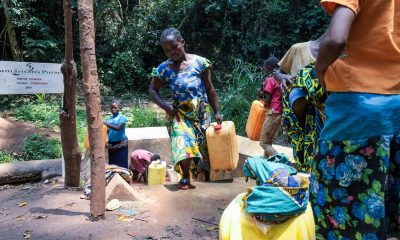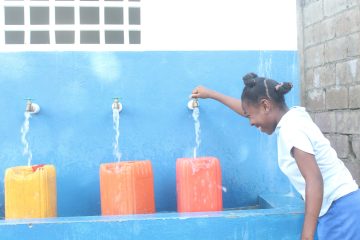A small West African village receives a new well and, with it, new neighbors to share the Gospel
Galba is a small, dusty village located in south-central Niger. The people who live there face many problems that are common in Niger—poverty, lack of jobs, famine, and poor health. But, until recently, perhaps the biggest problem that Galba faced was poor access to clean water. The only well in the village was dirty and smelly, and the water inside was clearly polluted.
In November 2015, Samaritan’s Purse sent a team to rehabilitate the polluted well.
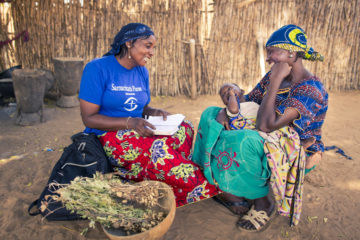
A Samaritan’s Purse staff member meets with a mother and her baby in Galba.
We also sent Abdoulaye Toudou and his wife, Tigadeba Pallo, to live in Galba as evangelists.
At first, people in the village were wary of their new Christian neighbors. But as they noticed Abdoulaye and Tigadeba trying to integrate into their community—getting water at the new well, cleaning around the community, and sacrificing comforts they had when they lived in the city—they began to accept them.
The well was only the beginning of change in Galba. As Abdoulaye and Tigadeba formed relationships with their neighbors, they began teaching them about sanitation and hygiene. Although the new well provided clean water, the couple knew that it wouldn’t make a big difference unless the villagers began to care for themselves and their community.
They began by cleaning the community. When Abdoulaye and Tigadeba arrived, trash was everywhere, and the village smelled from open defecation. Today, clean sand can be seen for miles in the village. Next, the couple taught about personal health and helped the villagers build latrines. Tigadeba led a women’s group to teach the women how to care for their children, especially when they were ill, and she also informed them that they should go to the health center while pregnant to receive prenatal care. The same women also learned how to transport and consume water safely.
A Woman to Lead
During one class session, the women were charged with picking a leader mother from among their peers. This woman would be in charge of spreading health and hygiene messaging among the village—becoming a role model for the other women. The group chose 25-year-old Djamila Souley.
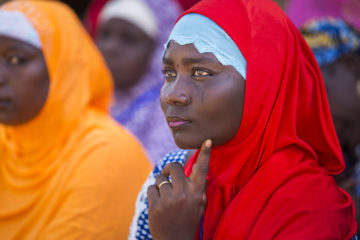
Djamila listens to a lesson taught by Samaritan’s Purse staff members. She will model the lesson in her home, encouraging others in the village to do the same.
“People, they trusted me,” Djamila said. “They believed that I can be a leader, so they’ve chosen me. And myself, I felt like I will gain a lot in terms of learning things.”
Djamila has taken her role as leader mother seriously. Her home and yard are spotless—no trash can be seen anywhere. Her family uses a latrine. And her children—ages 10, 8, and 16 months—are clean and healthy. Djamila’s 10-year-old daughter is learning from her and has begun helping to care for her baby brother and clean the house.
Finding New Faith Despite Persecution
Djamila has also appreciated having Abdoulaye and Tigadeba in her community. Although she has not yet accepted the Gospel message, she pays close attention to the example the couple is setting.
“Their lifestyle is like an example for us,” Djamila said. “The compassion that they’re showing, and also the help that they do, [and] the love they are showing to people.”
Abdoulaye said that he knows change is a process and that it takes time for people to take ownership of what they’re taught. He’s not discouraged that many in the village haven’t yet accepted Christ. He and Tigadeba have seen some success, and that encourages them.
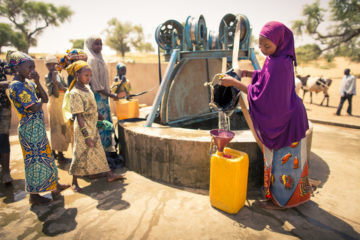
Kahina* gets water from the well in Galba.
Some converts are open about their newfound faith, and they face persecution. In a country that is 98 percent Muslim, many Christians don’t know anyone else who shares their faith. Kahina*, another woman in the village, has accepted Christ, but she stays quiet about it to avoid being persecuted.
“I’m very happy to learn what I learned,” she said. “I like it and I enjoy it so much, and I believe in it. All the things I learned from evangelism and education will really help me because I am using them and I will keep using them in my life.”
Kahina’s son has also accepted Christ since Abdoulaye and Tigadeba have been in the village. In a public profession of faith, he was baptized. During Ramadan, the ninth month of the Islamic calendar, he refused to observe the strict fasting required for Muslims. People in the village persecuted him because of his refusal, but since then, they have accepted his faith. Abdoulaye and Tigadeba have opened their home to other converts in the village who are afraid.
A Whole Village Changed
Although spiritual change is coming slowly, it is happening. And if the physical changes in the community are any indication, spiritual change is going to happen on a big scale. Most people have latched onto the teachings about sanitation and hygiene and have begun modeling their lives after Abdoulaye and Tigadeba. From one well, an entire community is changing.
“It’s helping the whole village because we’re now getting clean water and everybody is happy,” Djamilia said. “It goes beyond my household to the whole community.”
*Name changed to protect identity.

